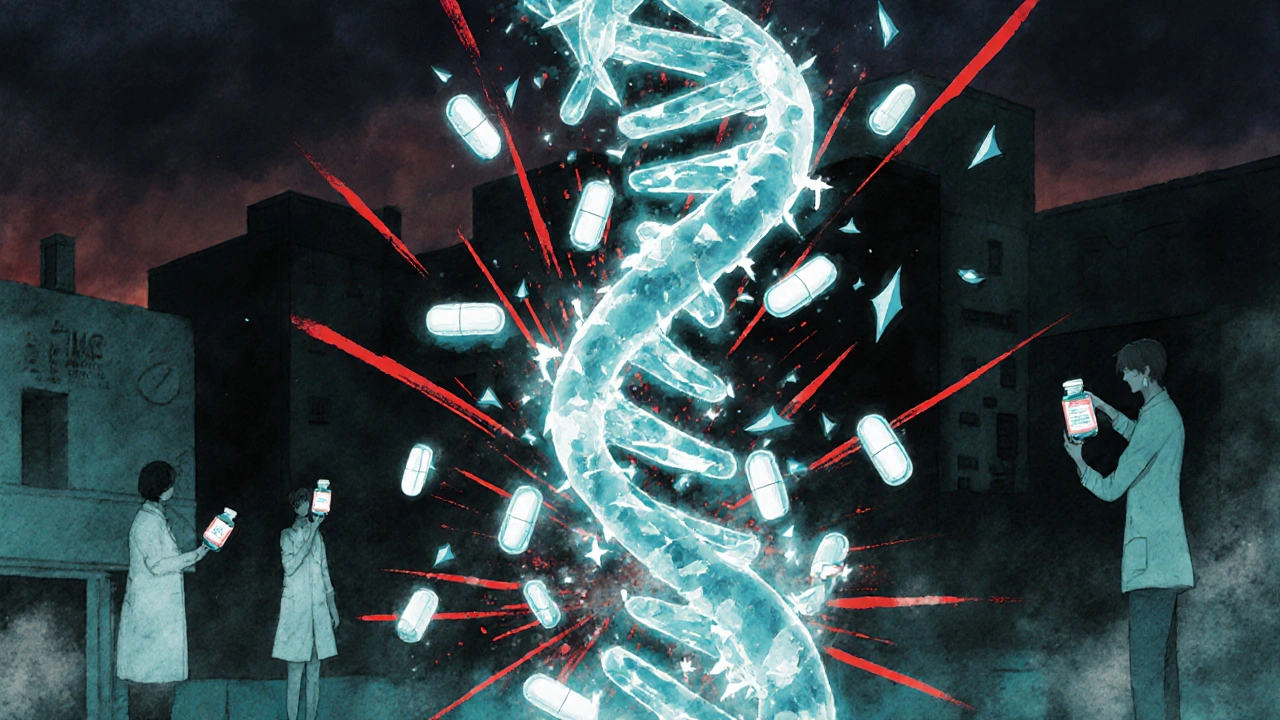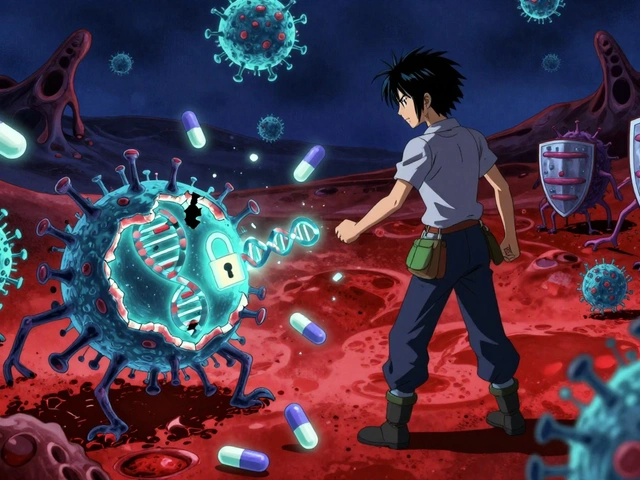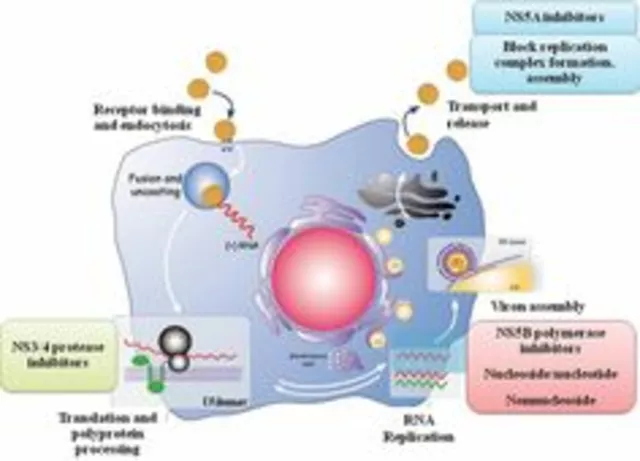Pharmacogenetic Risk Checker
Check Your Genetic Risk
This tool identifies potential risks for common drug reactions based on known genetic variants. Results are educational only and do not replace professional medical advice.
Have you ever taken a medication that made you feel worse instead of better? Maybe you got dizzy on a common blood pressure pill, or broke out in a rash after starting an antibiotic. For some people, these reactions aren’t random. They’re written into their DNA.
Why Some People React Badly to Drugs That Others Tolerate
Not everyone responds to medicine the same way. Two people taking the same dose of the same drug can have completely different outcomes. One feels relief. The other ends up in the hospital. This isn’t about dosage errors or allergies in the traditional sense. It’s often about genetics. Your genes control how your body breaks down drugs, how they reach their targets, and how strongly those targets respond. Small differences in your DNA-called polymorphisms-can turn a safe medication into a dangerous one. These aren’t rare mutations. They’re common variations found in large portions of the population. Take CYP2D6, a liver enzyme that processes about 25% of all prescription drugs. Some people have a version of this gene that works too slowly (poor metabolizers). Others have extra copies and break down drugs way too fast (ultrarapid metabolizers). A poor metabolizer taking codeine won’t convert it to morphine effectively, so it doesn’t relieve pain. An ultrarapid metabolizer? They turn codeine into morphine so quickly that it can cause dangerous breathing problems-even in babies breastfeeding from a mother taking normal doses. The FDA has issued black box warnings about this exact risk.Genes That Can Turn a Safe Drug Into a Life-Threatening One
Some gene-drug combinations carry extreme risks. The most well-documented is the HLA-B*15:02 allele. People with this genetic marker who take carbamazepine (used for epilepsy and bipolar disorder) or phenytoin have up to a 150 times higher chance of developing Stevens-Johnson Syndrome or Toxic Epidermal Necrolysis-rare but deadly skin reactions that destroy the outer layer of skin and mucous membranes. Testing for HLA-B*15:02 before prescribing these drugs is now standard practice in many countries, especially for patients of Southeast Asian descent, where the allele is most common. The good news? If you test negative, your risk of this reaction drops to nearly zero. The negative predictive value is over 90%. Another major player is CYP2C19. People with poor metabolizer variants of this gene can’t process proton pump inhibitors like pantoprazole properly. That means the drug builds up in their system. In children, this can lead to serious side effects, so the FDA recommends lower doses for these individuals. Warfarin, a blood thinner, is another classic example. Two genes-VKORC1 and CYP2C9-explain nearly 40% of why people need vastly different doses. One person might need 5 mg per day. Another might need 15 mg. Giving the wrong dose can lead to dangerous bleeding or ineffective clot prevention. Genetic testing can guide initial dosing, reducing hospitalizations in the first weeks of treatment.Cardiac Risks Hidden in Your DNA
Some drug side effects aren’t obvious until it’s too late. A common antibiotic or anti-nausea medication might trigger a sudden, irregular heartbeat called torsades de pointes. This can lead to cardiac arrest. About 5% of people who experience this reaction have a hidden genetic form of Long QT Syndrome-something they never knew they had. Mutations in genes like KCNQ1, KCNH2, and SCN5A make the heart’s electrical system extra sensitive to certain drugs. Even a normal dose can push the system over the edge. The ANK2 gene has also been linked to exaggerated QT prolongation. In one study, 14 out of 635 patients with drug-induced QT issues had rare variants in this gene. These weren’t random. They were functional defects that matched the severity of their heart rhythm problems.
Why Some Side Effects Are Predictable-and Others Aren’t
Not all side effects are created equal when it comes to genetic prediction. A 2024 study in PLOS Genetics found that cardiovascular side effects-like high blood pressure, irregular heartbeat, or rapid pulse-are the most predictable based on genetics. The positive predictive value? Nearly 30%. That means if your genes suggest you’re at risk, there’s a strong chance the side effect will happen. Gastrointestinal side effects? Much less predictable. Nausea, diarrhea, or stomach upset from a drug are rarely tied to a single gene. They’re more likely caused by how your gut reacts to chemicals, stress, or even your microbiome. This matters because it tells us where to focus. If you’re trying to prevent serious harm, testing for genes linked to heart rhythm problems or severe skin reactions makes sense. Testing for genes linked to mild nausea? Not so much.Testing Is Available-but Most Doctors Don’t Use It
You can get tested. Companies like Color Genomics, OneOme, and 23andMe (in their health reports) offer pharmacogenetic panels that check for key variants in CYP2D6, CYP2C19, CYP2C9, HLA-B*15:02, VKORC1, and others. The cost? Between $250 and $500. But here’s the problem: most doctors don’t order these tests. A 2023 survey found that 68.5% of physicians felt they weren’t trained enough to interpret the results. Only 22% use them routinely. Even when results are available, many hospitals don’t have systems in place to alert doctors. If your genetic data sits in a file and no one sees it, it doesn’t help. Some places are ahead of the curve. Vanderbilt’s PREDICT program found that when genetic results were integrated into electronic records, clinicians changed prescribing decisions for over 12% of patients-mostly to lower doses or avoid drugs entirely. One patient with a CYP2D6 poor metabolizer status avoided the severe nausea her sister had on tamoxifen. She waited three weeks for the test. But the delay saved her from weeks of suffering.
The Gap Between Science and Practice
The science is solid. The FDA’s Table of Pharmacogenetic Associations lists 128 gene-drug pairs with clear recommendations. Clinical guidelines from CPIC cover 21 drugs with 24 detailed protocols. Yet only 10-15% of these actionable variants are actually used in routine care. Why? Because integrating genetics into busy clinics is hard. It takes time, training, and tech. Electronic health records often don’t flag genetic risks. Pharmacists aren’t always involved. Insurance doesn’t always cover testing. Medicare, for example, only covers 7 of the 128 FDA-recommended tests. And there’s another issue: representation. Over 90% of pharmacogenetic studies have been done in people of European descent. But genetic variants differ across populations. African ancestry groups have higher genetic diversity, meaning more variants-and more risk-go undetected because the data doesn’t reflect them.What You Can Do
If you’ve had bad reactions to multiple medications, or if a close relative had a serious side effect, ask your doctor about pharmacogenetic testing. It’s not a magic bullet, but it can prevent serious harm. You don’t need to get tested before every prescription. But if you’re starting long-term treatment-for depression, heart disease, epilepsy, or cancer-it’s worth discussing. A single test can guide your care for years. And if you’re a patient who’s been told, “We don’t do that here,” ask for a referral to a clinical pharmacist or genetics specialist. They’re the ones who understand how to use this data. The future of medicine isn’t one-size-fits-all. It’s personalized. Your genes are part of your medical story. It’s time we start reading them.Can genetic testing prevent all drug side effects?
No. Genetic testing only helps with side effects caused by known gene-drug interactions. Many side effects-like mild nausea, dizziness, or headaches-are not linked to specific genes and can’t be predicted this way. Testing reduces risk, but doesn’t eliminate it.
How accurate are direct-to-consumer genetic tests for drug reactions?
They’re accurate for the variants they test-but many don’t test for all clinically important ones. Some companies only check CYP2D6 and CYP2C19, missing key markers like HLA-B*15:02. The FDA has issued warnings to companies that overstate the clinical use of their results. For medical decisions, use tests ordered through a doctor or clinical lab.
If I test negative for HLA-B*15:02, can I safely take carbamazepine?
Yes. A negative result means your risk of Stevens-Johnson Syndrome from carbamazepine is extremely low-less than 1%. This is one of the strongest and most reliable gene-drug predictions in medicine. If you’re of Southeast Asian descent, this test is considered standard before starting the drug.
Is pharmacogenetic testing covered by insurance?
It depends. Medicare and private insurers cover testing for specific drugs like warfarin, clopidogrel, and certain cancer therapies. But coverage for preemptive testing (testing before any drug is prescribed) is rare. Only about 28% of Medicare Advantage plans cover it in 2023. Always check with your insurer before testing.
Can I get tested before I need a drug, or only when I’m prescribed one?
You can get tested anytime. Some hospitals, like Mayo Clinic, offer preemptive testing as part of routine care. Once your DNA is analyzed, the results can be stored in your medical record and used for future prescriptions. One test can guide your care for life.
What if my genetic test shows I’m a poor metabolizer for multiple drugs?
It means you’ll need lower doses or alternative medications for many common drugs. For example, poor CYP2D6 metabolizers may need to avoid codeine, tramadol, and some antidepressants. A pharmacist or genetics specialist can help you build a personalized list of safe and unsafe drugs based on your results.
Are there any downsides to genetic testing for drug reactions?
Yes. False positives or misinterpretations can lead to unnecessary drug avoidance. For example, some people with HLA-B*15:02 test results are denied effective seizure medications even when their risk is low. Also, testing may cause anxiety or delay treatment while waiting for results. Always discuss results with a qualified professional.
Will my genetic data be shared with insurance companies?
In the U.S., the Genetic Information Nondiscrimination Act (GINA) protects you from health insurance and employment discrimination based on genetic data. But GINA doesn’t cover life, disability, or long-term care insurance. Always ask how your data will be stored and who can access it before testing.




Shilpi Tiwari
November 18, 2025 AT 04:29Okay but let’s talk about CYP2D6 polymorphisms in South Asian populations-most pharmacogenomic databases are Eurocentric, and we’ve got unique variants like *10 and *41 that aren’t even on most DTC panels. I’ve seen patients in Mumbai on SSRIs with near-zero efficacy because their metabolizer status was misclassified. We need population-specific allele frequency maps, not just imported guidelines. This isn’t just about precision medicine-it’s about equity.
Christine Eslinger
November 18, 2025 AT 15:02I’ve been a clinical pharmacist for 18 years and I still get chills when I see how genetics can prevent disaster. A woman came in with a history of three hospitalizations from codeine-turns out she was an ultrarapid metabolizer. We switched her to non-opioid alternatives and she cried because she finally felt normal. This isn’t sci-fi. It’s science we’re not using. We need to stop treating genes like optional trivia and start treating them like vital signs.
Brenda Kuter
November 20, 2025 AT 14:51EVERYTHING IS A GOVERNMENT EXPERIMENT. Did you know the FDA only approves 7 tests because they’re paid off by Big Pharma? They don’t want you to know your genes so you keep buying drugs. HLA-B*15:02? That’s a cover-up for the real cause-5G radiation weakening your DNA. They tested it on Southeast Asians because they’re easier to control. I’ve got my DNA on a USB drive and I’m not letting any hospital touch it. THEY’RE WATCHING.
Shaun Barratt
November 20, 2025 AT 20:34While the scientific underpinnings of pharmacogenomics are robust, the translational infrastructure remains critically underdeveloped. The disconnect between validated genetic markers and clinical decision support systems represents a systemic failure in healthcare informatics. Furthermore, the absence of standardized interoperability protocols impedes the integration of pharmacogenetic data into EHRs. A pragmatic solution would require institutional investment in both technological and educational domains.
Iska Ede
November 22, 2025 AT 09:53So let me get this straight-my grandma died from a rash after taking carbamazepine, and now you’re telling me it was her DNA and not the corporate poison they slipped into the pill? I’m just saying… if they’d tested her, she’d still be here. And now they want me to pay $500 to find out if I’m next? That’s not medicine. That’s a survival game with a co-pay.
Gabriella Jayne Bosticco
November 23, 2025 AT 12:51My sister’s a nurse in London and she told me about a guy who got a pharmacogenetic test before his chemo-turned out he couldn’t metabolize 5-FU. They switched his regimen and he’s been in remission for two years. It’s not magic. It’s just… smarter. Why aren’t we doing this for everyone? You don’t need a PhD to understand that one size doesn’t fit all. Especially not when someone’s life is on the line.
Sarah Frey
November 24, 2025 AT 05:56It is imperative to acknowledge that while pharmacogenetic testing holds significant promise, its implementation must be guided by ethical principles, clinical utility, and equitable access. The current landscape, characterized by disparities in testing availability and interpretation, risks exacerbating existing health inequities. A coordinated, multidisciplinary approach involving clinicians, pharmacists, genetic counselors, and policymakers is essential to bridge the gap between discovery and delivery.
Katelyn Sykes
November 24, 2025 AT 10:42My doctor said they don’t do genetic tests here so I went to 23andMe and found out I’m a CYP2C19 poor metabolizer turns out I’ve been on the wrong antidepressant for 5 years and that’s why I felt like a zombie the whole time I wish I’d known sooner but at least now I’m not taking pills that make me worse
Yash Nair
November 24, 2025 AT 14:35Indians dont need this testing we have strong genes from ayurveda and yoga our bodies handle drugs better than westerners who eat junk and take 10 pills a day. This is just another american scam to sell tests. Our grandmothers took turmeric for pain and lived to 90. Why are we listening to white doctors with their lab machines and expensive tests? We dont need their science. We have our own.